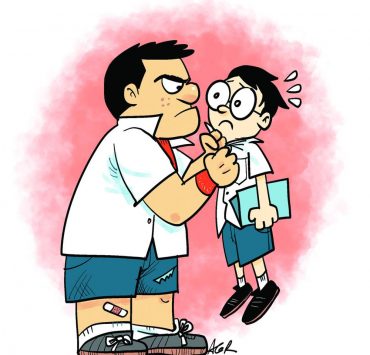Empowering children with essential life skills

How do we best equip our children with the necessary life skills to succeed? At the Positive Parenting Summit online hosted by A Fine Parent Academy, Dr. Peg Dawson, coauthor of “Smart but Scattered,” discussed the importance of developing executive skills in children.
Executive skills are skills you need to get things done. Dr. Dawson, an award-winning expert with the National Association of School Psychologists and a veteran at the Center for Learning and Attention Disorders in New Hampshire, emphasized that understanding the developmental timeline of these skills can help parents better support their children.
Parents and educators often assume children will naturally pick up skills like organization or task initiation, but these must be taught thoroughly. She stressed the need for explicit modeling and teaching of executive skills. For example, teachers give students five minutes to pack their belongings, reinforcing organization skills. Similarly, parents can guide children in cleaning their rooms by labeling the activity and explaining its importance, such as “so we know where to find our stuff when we need it.”
Said Dr. Dawson, “‘Lazy’ is often how parents see their kids. This should be banned. What their child is just struggling with is task initiation and sustained attention. Every kid is different, so come up with a routine. If they get 80 percent of their tasks done in a week on their own, that’s good enough.” By focusing on teaching these skills rather than labeling behaviors negatively, parents can foster a more solution-oriented mindset.
Foundational skills
She outlined foundational executive skills that parents of grade-schoolers should focus on developing:
- Response inhibition: Being able to pause and think before acting, promoting self-control and delayed gratification.
- Working memory: Essential for performing complex tasks; visual aids can enhance this skill. “We always expect this to be perfect for others,” said Dr. Dawson. “But never rely on verbal instructions alone. Have a visual to support the steps in the process.”
- Emotional control: Managing emotions to accomplish tasks, which can be made easier by turning learning into a game, making the experience positive.
- Flexibility: Adapting to change effectively.
- Sustained attention: Maintaining focus despite distractions, fatigue or boredom.
- Task initiation: Starting nonpreferred tasks promptly, a skill that often develops later in life. Dr. Dawson revealed that this skill is the hardest to acquire, as our tendency to procrastinate increases till our mid- to late-20s and decreases gradually only after that.
Knowing this, we now realize it’s unfair to expect our young kids to have and execute all these skills before their mid-20s perfectly. So what can we do to help them learn it before then?
Breaking down tasks
As children grow, advanced skills like planning, organization, time management, goal-directed persistence and metacognition become vital.
For planning, instead of just ordering kids to “clean up this mess,” Dr. Dawson advised breaking down tasks into manageable parts and using visual checklists to support children’s morning routines or other daily activities. This structured approach helps children feel accomplished and motivated, fostering self-mastery.
To help kids get organized, enable them to create a system to maintain over time. Cueing supervision can help them keep track of belongings when away from home.
For time management, introduce the concept of time estimation, or how long it takes to do something, so they don’t leave things to the last minute. Dr. Dawson suggested gamifying it, such as “How long do you think it’ll take to do a task? Let’s see if you’re right.” Kids tend to overestimate tasks they dislike, so comparing their projection (“it will take forever!”) to the actual time it took (10 minutes) will show them something concrete and doable.
To nurture goal-directed persistence for longer-term goals, follow through a task to completion. “This is a killer skill for middle school parents,” she said. “We expect kids to have this when they don’t care about it yet.” If they don’t care about getting awards, get them to focus on something they value; for instance, saving up for something they like.
ABC model
Dr. Dawson also introduced the ABC model to guide children:
Antecedents: Alter the environment to reduce distractions, such as turning off the TV during homework.
Behaviors: Teach skills like wearing headphones for focus or mentally blocking distractions.
Consequences: Reward positive behavior with treats like allowing playtime after completing tasks or giving effective praise (“I love how you did that without my having to ask you!” or “I saw you working hard to control your temper when your brother was trying to push your buttons, I’m proud of you!”). The recommended reward is for a child to identify something they want to do that they’ll get to do after the nonpreferred task. These are built into their environment anyway and don’t cost extra.
She stressed the significance of tailoring expectations to a child’s developmental level and moving from external support to internal motivation. Providing enough guidance for a child to succeed is crucial, as self-mastery is a powerful motivator for independence.
She encouraged parents to collaborate with their children in creating routines and checklists, emphasizing that children learn best when they understand the rationale behind tasks.
Checklists can help establish preferred behaviors, but diligence and consistency are key and it’s the parent’s role to enforce them. “Parents get frustrated that kids should know the routine by now. But if they don’t care about it, they’ll need supervision,” said Dr. Dawson. She recommended starting with a morning routine and doing it together (“Let’s think about what we need to do to get ready for school”).
Dr. Dawson stressed, “Don’t expect your child to pick this up from observing you. Success depends on the child’s developmental level. Move from external to internal by modifying the environment before changing the child. Realize the need to cue them externally and provide enough support for your child to succeed.”

















